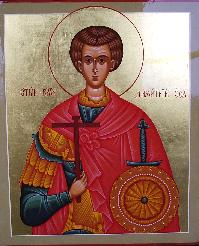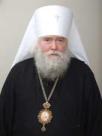Saturday, November 8, 2014
St Demetrius the Great-Martyr and Christian attitude to sensual pleasures
 St Dimitri was a high-ranking official in Thessalonica. He not only cared for the people’s material well-being, but also taught them the Christian faith. This is why Emperor Maximian imprisoned him.
St Dimitri was a high-ranking official in Thessalonica. He not only cared for the people’s material well-being, but also taught them the Christian faith. This is why Emperor Maximian imprisoned him.
Emperor Maximian loved bodily and vain pleasures. He organised spectacles where Lyaeus, a giant, from a platform would throw innocent victims onto tightly-spaced, upright spears, so that they would be stabbed to death. However, a Christian youth, Nestor, was found who would deprive the Emperor of his favourite entertainment. It was Dimitri who blessed and encouraged this struggle, which culminated in Lyaeus the giant being killed by a weak teenager.
In the context of St Dimitri and St Nestor’s struggles, it is appropriate to ask ourselves: What is the Christian attitude to sensual pleasures?
a. The purpose of pleasures and entertainments is to give us an essential rest from work. Ever since the expulsion of man from paradise, hard work has been necessary.
..cursed is the ground for thy sake; in sorrow shalt thou eat of it all the days of thy life. Thorns also and thistles shall it bring forth to thee.
Genesis 3:17-18
Our work is usually associated with sweat and sorrows. The body requires rest to renew its strength, through food and sleep. The soul seeks to forget its sorrows and renew its powers in activities of a higher nature, such as art, which remind it of the perfection of Paradise. This is natural, or even essential, and therefore not to be condemned.
b. But before we give ourselves over to pleasures, we must ask ourselves, is our body and soul really exhausted from hard, but useful, important and unavoidable work? Should we allow it a deserved reward? Or is our life filled with boredom and heaviness of soul, the fruit of idleness rather than hard work? The Apostle says
…if any would not work, neither should he eat.
1 Thessalonians 3:10

St Nestor defeats the giant Lyaeus. Bottom right: St Demetrius blessing St Nestor
c. Does the pleasure we propose strengthen us, and not, on the contrary, further exhaust our bodily powers? Will it lift up your soul, or will it weaken the mind? Will it enliven your heart with pure, deep and life-giving joy, making the soul ready and cheerful for work; good-tempered and patient in sorrows? If not, then it is better for the soul to deny itself such pleasure. The Apostle says:
All things are lawful for me, but all things are not expedient: all things are lawful for me, but all things edify not.
1 Corinthians 10:23
d. Will this pleasure distract us from some other, more important tasks? For example, our civil or spiritual duties? If it does, our pleasure is not only harmful, but directly criminal! If, when the Church calls him to glorification of God’s love and mercy, when She celebrates the greatest mysteries of our salvation, an Orthodox Christian spends his time in sensual pleasures, is this not an obvious disdain of the customs of the Church, and of God Himself? Such pleasure becomes a mockery of God, worthy of punishment.
e. However, the foremost danger in sensual pleasures is that they may bind our heart to themselves, becoming an inextricable need of our soul. They can deprive us of spiritual freedom, which a Christian must treasure more than everything. This freedom allows the Christian to be independent of everything earthly, so that he does not fear anything. He is the lord of his desires and feelings, the king of his internal world. Only this freedom allows him to conquer temptation. It is attainable by constant self-denial and patience, constant conquering of one’s own tendencies and cutting off one’s own will, and the ability to deny oneself in everything. If we always give in to our sensual desires, then we are submitting ourselves to pleasure, giving it power, and allowing it to become stronger, more demanding and persistent.
My brother Christians! Apart from the will of God, which governs us all, whatever else we are conquered by, leads to a shameful slavery for our God-like, reasonable and free soul. Giving in to fleshly pleasure and sinful passions is the same as selling ourselves as slaves to sin; may God save us from this.
Abridged from Protopriest G. Dyachenko: Full yearly cycle of short lessons.
26 October: St Demetrius, from the works of Demetrius of Cherson





